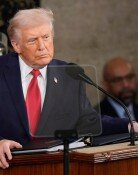Japan's anti-nuclear principles doubted
Japan's anti-nuclear principles doubted
Posted August. 31, 2000 13:20,
The Japanese government always has maintained the supposed national policy of the "Three Anti-Nuclear Principles" proclaimed in 1967 by the then Prime Minister Sato Eisaku.
"Let`s not own, manufacture nor allow in nuclear (arms)," Sato said.
However, in 1960, seven years before the declaration by Sato, the principle of non-presence of nuclear arms was breached.
The Japanese vernacular daily Asahi Shimbun reported Wednesday that it had obtained declassified documents from the National Archives and Records Administration that reveals a security treaty between Japan and the United States made in 1960 in which Japan breached the non-presence principle.
Until now, the revision of the security accord agreed to in 1951 by the two nations, the questions of military operations utilizing military base in Japan against foreign powers, the transport of nuclear arms, and the placement of mid- and long-range missiles have become issues that require additional agreements on a case-by-case standard.
However, according to the recently publicized as the classified agreement of the U.S.-Japan security accord, the mutual agreement on the nuclear arms presence designated Japan as a nation that would allow transportation and storage of nuclear arms. As such, aircraft or ships carrying nuclear arms or machinery could freely enter Japanese waters or airspace without additional negotiation.
Also, although United States and Japan must agreed through additional negotiation for the use of the military base in Japan for the military operation against a third power, an exception exists in the case of Korea that should the United Nations Forces in Korea come under military attack, the United States has an unconditional right to utilize the military base in Japan for counter strikes.
Many in the Japanese academic circle long have suspected such classified agreements. At one time, much contention was raised by certain organizations that had requested U.S. submarines to submit documents pledging the non-stowage of nuclear arms.
At such times, the Japanese government reiterated the "three anti-nuclear principles" and denied the existence of any secret agreement.
"There are not any secret promises concerning security agreement," a Japanese Foreign Affairs spokesperson said in the face of the accusations. "Such trivialities are not something that need nit-picking investigation or a complaint to the United States."
However, with the revelation of the recent findings, Japan will not be able to escape the charge that the three anti-nuclear principles were a big sham.






![‘부화방탕 대명사’ 북한 2인자 최룡해의 퇴장 [주성하의 ‘北토크’]](https://dimg.donga.com/c/138/175/90/1/wps/NEWS/IMAGE/2026/02/27/133414028.1.jpg)
